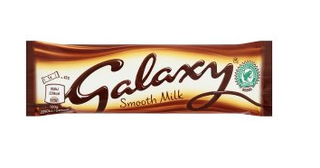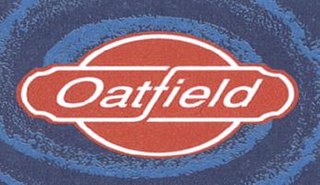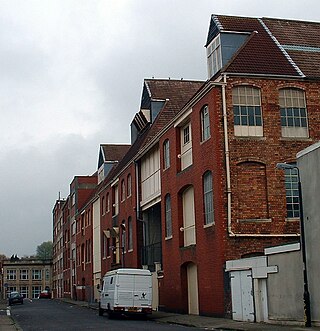
The Heath bar is a candy bar made of toffee, almonds, and milk chocolate, first manufactured by the Heath Brothers Confectionery in 1928. The Heath bar has been manufactured and distributed by Hershey since its acquisition of the Leaf International North American confectionery operations late in 1996.

Galaxy is a chocolate bar, made and marketed by Mars Inc., and first manufactured in the United Kingdom in 1960. Galaxy is sold in the United Kingdom, Ireland, South Africa, the Middle East, Morocco, India, Pakistan, Australia, Malta, and is also sold in the United States, Canada, Mexico and various Continental European countries as Dove. In 2014, Galaxy was ranked the second-best-selling chocolate bar in the UK, after Cadbury Dairy Milk.

J.H. Whittaker & Sons, Ltd (Whittaker's) is a New Zealand confectionery manufacturer specialising in palm oil-free chocolate, based in Porirua. Whittaker's is the largest chocolate brand in New Zealand. Approximately 30% of their production is now exported. The company controls its entire manufacturing process in its facility in Porirua, identifying itself as a "bean-to-bar" manufacturer. James Henry Whittaker (1868–1947) started the business in Christchurch in 1896 and it was later moved to Wellington.
Crunchie is a brand of chocolate bar with a centre of honeycomb toffee. It is made by Cadbury but was originally launched in the UK by J. S. Fry & Sons in 1929.

Treets were a brand of confectionery sold by Mars Limited in the United Kingdom, Italy, France, Germany, Belgium and the Netherlands.

The Wonka Bar was originally a fictional chocolate bar, introduced as a key story point in the 1964 novel Charlie and the Chocolate Factory by Roald Dahl. Wonka Bars appear in each film adaptation of the novel: Willy Wonka & the Chocolate Factory (1971); Charlie and the Chocolate Factory (2005); and Wonka (2023). The bar also appeared in the musical adaptation of the novel, Charlie and the Chocolate Factory (2013).
Butter Brickle is a chocolate-coated toffee first sold on November 20, 1924, by candy manufacturer John G. Woodward Co. of Council Bluffs, Iowa, and toffee pieces for flavoring ice cream, manufactured by The Fenn Bros. Ice Cream and Candy Co. of Sioux Falls, South Dakota.

Quality Street is a line of tinned and boxed toffees, chocolates and sweets, first manufactured in 1936 by Mackintosh's in Halifax, West Yorkshire, England. It was named after J. M. Barrie's play Quality Street. Since 1988, the confectionery has been produced by Nestlé. Quality Street has long been a competitor to Cadbury Roses, which were launched by Cadbury in 1938.

Cadbury Roses is a brand of chocolates made by Cadbury. Introduced in the UK in 1938, they were named after the English packaging equipment company "Rose Brothers" based in Gainsborough, Lincolnshire, that manufactured and supplied the machines that wrapped the chocolates.

Sky Bar is an American candy bar introduced by Necco in 1938, discontinued in 2018, and reintroduced in 2019 by the Sky Bar Confectionary Company. Each Sky Bar has four sections, each with a different filling—caramel, vanilla, peanut, and fudge—all covered in milk chocolate.
Prince Polo is a Polish wafer chocolate bar and one of Poland's top-selling confectionary brands. It is also sold in the Czech Republic, Slovakia, Hungary, Lithuania, and Ukraine under the name Siesta, and in Iceland where it is often called Prins Póló. According to measurements shown by Nielsen, the bar has been the most sold chocolate bar for decades in Iceland and was for many years one of the few chocolate bars available in the country.

Côte d'Or is a producer of Belgian chocolate, owned by Mondelez International. Côte d'Or was founded in 1883 by Charles Neuhaus in Schaerbeek, Belgium, a chocolate manufacturer who used the name "Côte d'Or" referring to the old name of contemporary Ghana, the source of many of the cacao beans used in chocolate manufacturing.

Eat-More is a chocolate bar made by Hershey. It consists of dark toffee, peanuts and chocolate. It was created in Canada by the Lowney company, which was acquired by Hershey Canada on July 1, 1987 from Nabisco Ltd. An early 1930s contest to name the chocolate bar was won by Angus B. MacDonald of New Waterford, Cape Breton Island, Nova Scotia; his prize was an art deco-style clock fashioned to look like a measuring tape.

Oatfield was a chocolate and confectionery manufacturer located in Letterkenny, County Donegal, Ireland. The company was the oldest confectionery manufacturer in Ireland.

Elizabeth Shaw Ltd is a Bristol-based company owned by Colian Holding that markets chocolate-based confectionery, including the brands Famous Names liqueur chocolates and Elizabeth Shaw Mint chocolates. The modern company was formed from several mergers of well established confectionery companies, first by J A & P Holland and then by James Goldsmith in the 1960s as part of his creation of his food conglomerate Cavenham Foods.

Ivory Coast leads the world in production and export of the cocoa beans used in the manufacture of chocolate, as of 2024 producing 45% of the world’s cocoa.

Dumle is a brand of chocolate-covered toffees marketed and manufactured by Fazer.
Mackintosh's was a British confectionery firm founded in Halifax, West Yorkshire, England. It was known for its toffee and the Quality Street and Rolo brands.
The Oatfield Emerald is a type of chocolate toffee sweet native to Ireland and is considered one of the country's most popular sweets and one of the "iconic names of the Irish sweet world".
Chokotoff is a chocolate toffee that was created by Côte d'Or in Belgium in 1934. It has become an iconic Belgian product.














